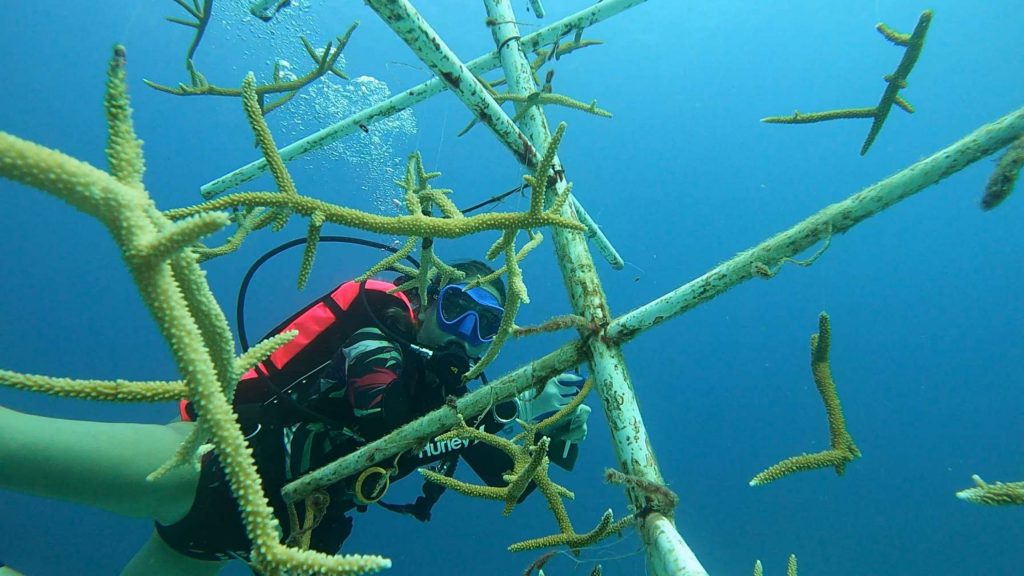Utila is a small island, totaling only 17 sq. kilometers, off the Caribbean coast of Honduras. This island is the smallest of the three main Bay Islands. Utila is famous for being a whale shark “hot spot”, a location where whale sharks, the biggest fish in the world, have been sighted year-round. The waters around the island boast a high concentration of marine biodiversity largely due to the surrounding Mesoamerican Reefs that are a part of the second-largest reef system in the world, after the Great Barrier Reef.
I am thrilled to be spending my summer on Utila working with a local NGO, the Whale shark and Oceanic Research Center (WSORC). My time with WSORC officially began on June 7th. For my first month here I am in a marine conservation internship program that involves 6 action-packed days each week spent learning both in the classroom and underwater, in addition to conducting research for an artisanal fisheries project I will be working on all summer. I have spent the first 3 weeks of my internship learning to identify nearly all of the marine life around the island and understanding the role each species plays in the ecosystem, as well as how reef health has fluctuated in recent years and why. So far, I have learned to identify 37 species of coral, more than 100 Caribbean fish, and 100 more reef-associated organisms ranging from cephalopods to sea slugs and macroalgae species. Confidently identifying these species is critical to be able to effectively conduct REEF survey dives as well as reef health surveys.
In addition to coral surveys, WSORC is working with another local NGO, Utila Coral Restoration, on several coral nurseries around the island. These nurseries provide ideal growth habitats for staghorn coral or Acropora cervincornis, a critically endangered species of coral that can be found locally. Our work on these nurseries includes cleaning the structures to remove algae and growth of organisms that could harm the coral as well as monitoring for any disease and adding coral fragments to the nursery trees. Eventually, these corals will be transplanted onto local reefs.

A third project we are working on is invasive species control, focused on lionfish. Lionfish are an invasive species that have quickly spread throughout the Caribbean since they were first introduced to the area in the late 1980s. They have no natural predators here, reproduce quickly, and eat a wide variety of the local fish population; for these reasons they pose an immense threat to the balance of reef ecosystems. In an effort to control their population, WSORC conducts regular lionfish hunts using sling-style spears. Because Utila is surrounded by the Bay Islands National Marine Park, spearfishing is prohibited for every species except lionfish and a specific license and training is required. After completing the training and learning how to do this as humanely as possible to avoid suffering for the fish, I participated in my first lionfish removal dives. Our group managed to remove 30 lionfish from the reef in two dives. Once we returned to shore, we dissected each fish and recorded the weight, total and standard length, stomach contents, and several other features before filleting them. After carefully removing the poisonous spines, the lionfish are safe to eat and quite delicious. Encouraging more people to eat them is one way to promote control of this invasive species, and to also shift the demand away from other species such as lobster or parrotfish that have a smaller population size and play an important role in the reef ecosystem here.
The last key component of my internship this month has been getting started on the fisheries project I will be working on all summer. I am assisting one of the marine biologists at WSORC to support the development and implementation of a series of surveys to deepen the understanding of the socio-economic characteristics of the artisanal fishing communities on the island. To our knowledge, a survey of this information has not been conducted on the island. This information will be a valuable baseline that could help inform future fishing policy through understanding the needs of the communities these fisheries support. This project is still in the design phase but stay tuned for more updates next month!
Overall it has been an incredible and ever-so-busy first 3 weeks on Utila. I can’t wait to continue developing the fisheries project and wrap up my final week of the internship this Saturday and then move on to divemaster training, so that I am qualified and prepared to lead interns underwater and assist with teaching the classes I’ve been taking this month, during August.


